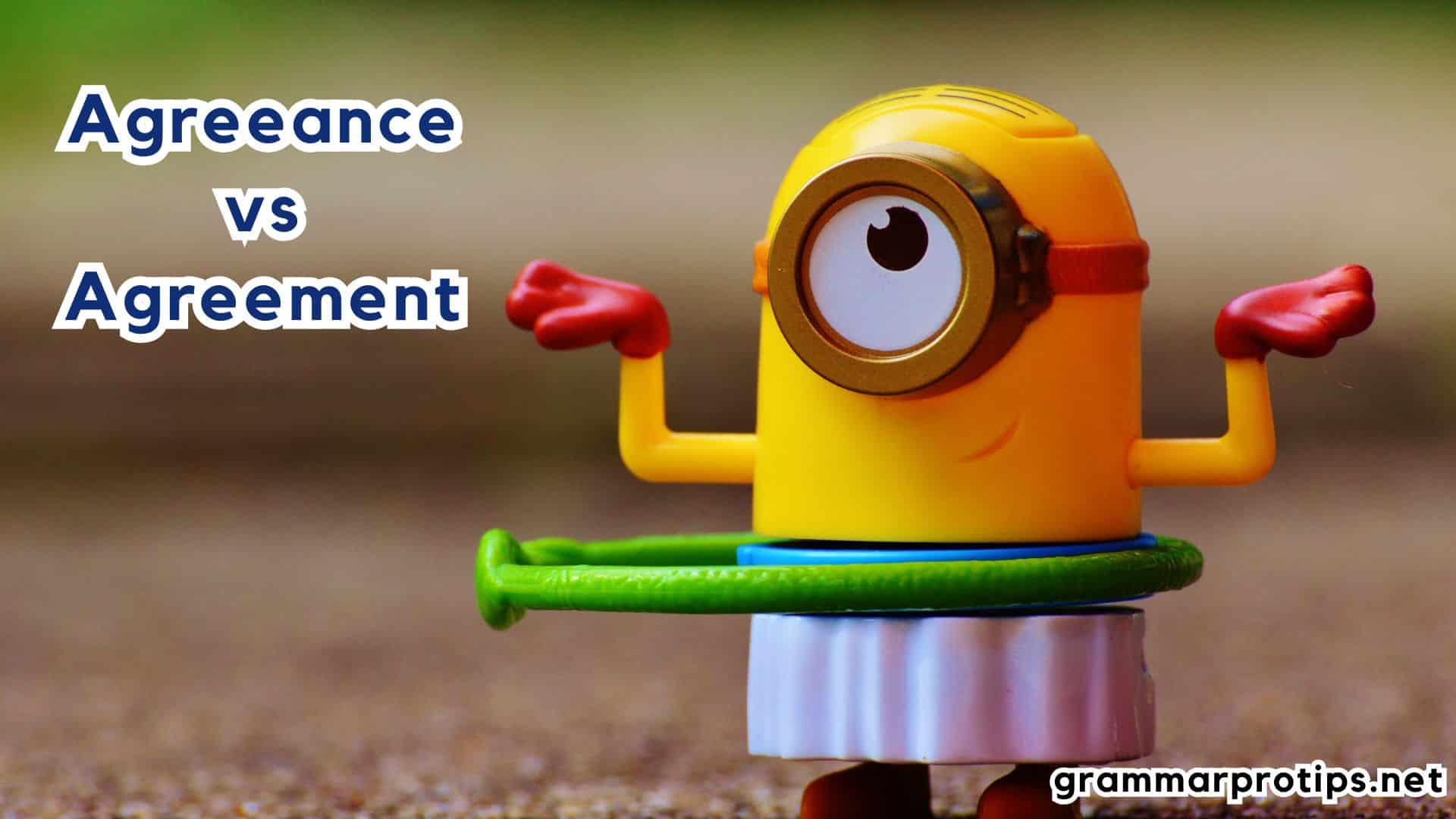English can be tricky, especially when it comes to words that sound similar but aren’t always used in the same way. One such pair is “agreeance” and “agreement.” While they may seem interchangeable, they have distinct meanings, uses, and histories.
In this article, we’ll explore the differences between agreeance vs agreement, delve into agreeance meaning, and offer helpful scenarios for each term’s appropriate usage.
By the end of this guide, you’ll have a clear understanding of when to use “agreeance” and when “agreement” is the correct choice.
What is Agreeance?
Let’s start with agreeance definition. Agreeance refers to the state of being in agreement or harmony with someone or something. However, it’s important to note that agreeance is a somewhat controversial word. While it’s commonly used in informal settings, it is often criticized for its redundancy or imprecision.
So, even though you may hear “agreeance” used in everyday conversation, it doesn’t always carry the same weight or credibility as “agreement.”
The agreeance etymology traces its origins back to the early 17th century. It was derived from the verb “agree,” with the -ance suffix added to indicate a state or condition of agreeing.
Is Agreeance a Real Word?
You might be wondering, “Is agreeance a real word?” The answer is yes—but with some caveats. While it appears in dictionaries like Webster and occasionally in older literary works, it is not as widely accepted in modern formal writing. In fact, some language experts argue that “agreeance” is not a word at all, preferring instead to stick to “agreement.”
So, while it might appear in speech, especially in certain regions, you should be cautious when using it in professional or academic contexts.
Agreeance Meaning in English
The agreeance meaning is relatively straightforward: it describes the act of being in accord or agreement with someone or something. However, its meaning tends to overlap heavily with agreement, making it more of a colloquial variant rather than a distinct term in its own right.
Agreeance can also be seen as a slightly informal or casual choice, which is why it often crops up in everyday conversations or casual emails. However, it’s best to stick to “agreement” in formal or legal contexts.
Agreeance vs Agreement: Key Differences
Now, let’s break down the agreeance vs agreement debate in detail. The main difference between the two is formality and acceptability in modern English.
- Agreement is the more widely accepted and formal term. It’s used in all types of writing, including business correspondence, legal contracts, and scholarly articles.
- Agreeance, on the other hand, is a less formal and somewhat outdated term. It’s rarely used in contemporary professional writing and can sound awkward in formal settings.
When to Use Agreement
Agreement is by far the more common and universally understood term. You’ll use it in various contexts, from legal documents to everyday communication. Here are a few scenarios where agreement is appropriate:
Scenario 1: Business Email
Let’s say you’re emailing a colleague about a project update. Here’s how you might use agreement:
Subject: Project Proposal Agreement
Hi Sarah,
I hope you’re doing well. I wanted to touch base on the project proposal. We’ve reached a consensus and have finalized all the terms. The agreement is ready for your review, and I’ll send it over by the end of the day.
Please let me know if you have any questions or concerns.
Best regards,
John
Scenario 2: Legal Contract
In legal contexts, agreement is used in official contracts or documents. Here’s an example:
AGREEMENT made and entered into this 14th day of January 2025 by and between Company A, herein referred to as “Party A,” and Company B, herein referred to as “Party B.”
Whereas both parties agree to the terms set forth herein, the parties have executed this Agreement to formalize their commitment to the terms described.
Using Agreeance: When It Works (and When It Doesn’t)
Though agreeance is less formal, it does show up in casual speech. Let’s see how it plays out in conversation or informal emails.
Scenario 1: Casual Conversation
If you’re chatting with a friend about a decision you both made, you might say:
“I’m in agreeance with you on this. Let’s move forward with it!”
Scenario 2: Informal Email
Let’s say you’re confirming a meeting time with a coworker. Here’s how you might use agreeance in an informal email:
Subject: Re: Meeting Time
Hey Alex,
Thanks for your response! I’m in agreeance with the 2 p.m. time slot. I’ll see you then!
Cheers,
Mark
While the above examples are fine in casual settings, agreeance should generally be avoided in professional or formal writing. Stick with agreement when you want to sound polished and clear.
Agreeance vs Agreement: Is One More Correct?
The debate of agreeance vs agreement is often subjective, and while many English speakers use agreeance, agreement remains the standard and more correct option for formal usage.
Language experts often advise that “agreeance” is unnecessary. Since “agreement” already conveys the same meaning, there’s no need to complicate matters by using a word that can cause confusion. Furthermore, “agreeance” has been criticized as somewhat egregious—meaning it strays from the accepted norms of modern English.
Agreeance Synonym
If you want to vary your vocabulary, here are some agreeance synonyms that might be a better fit depending on the context:
- Concord
- Accord
- Harmony
- Consensus
These synonyms carry similar meanings but are often more widely accepted and less likely to be questioned than agreeance.
Example Sentences: Agreeance and Agreement
Let’s look at agreeance in a sentence versus agreement in a sentence to clarify their usage further.
Agreeance in a Sentence:
- “After a long discussion, we reached agreeance on the new marketing strategy.”
- “I’m in agreeance with your proposal; it sounds like a great plan.”
Agreement in a Sentence:
- “The two companies signed an agreement to collaborate on the project.”
- “We need to formalize the agreement before we move forward.”
As you can see, agreement sounds smoother and more appropriate in the second set of sentences, especially in professional contexts.
Common Mistakes: Using “Agreeance” Where You Shouldn’t
One of the most common errors is using agreeance in places where agreement is expected. In certain situations, such as legal contracts or formal business communication, “agreeance” is not acceptable. Instead, you should always use “agreement”.
Is Agreeance in the Oxford Dictionary?
Is agreeance in the Oxford Dictionary? According to the Oxford English Dictionary, agreeance is listed, but it’s marked as an obsolete or archaic term. It appears in older texts but is not favored in contemporary writing.
Similarly, the Webster dictionary acknowledges agreeance, but again, it’s less common and often avoided in formal language.
Conclusion: Which One to Use?
In summary, agreeance and agreement may seem like similar terms, but agreement is by far the safer, more formal choice in most cases. Use agreement for legal, academic, and professional writing, and save agreeance for casual, conversational contexts if you wish.
While agreeance may still be used in casual speech, “agreement” is preferred in formal contexts to avoid sounding awkward or outdated.
So, the next time you’re deciding between agreeance vs agreement, remember this simple guideline: Stick with agreement for all formal occasions, and save agreeance for more relaxed situations, if necessary.
Table: Agreeance vs Agreement
| Factor | Agreeance | Agreement |
|---|---|---|
| Formality | Informal, casual | Formal, professional |
| Acceptance | Often criticized in modern English | Widely accepted and standard |
| Usage Context | Casual speech or email | Business, legal, and academic writing |
| Synonyms | Harmony, accord, consensus | Contract, understanding, pact |
Now that you understand the differences, you’re ready to confidently choose the right word in your writing!

Sienna Mauldon is a passionate writer and grammar expert. On her blog, she shares easy-to-follow guides to help readers master grammar rules and improve their writing. With a love for language and teaching, Sienna makes grammar simple and fun for everyone, from beginners to experienced writers.








